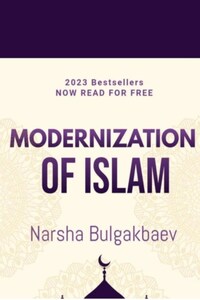Islam is the most conservative religion in the world, which does not recognize any changes that have happened to mankind since the time of the Prophet Muhammad. War, explosion, hunger, nakedness, refugees, desertion, terrorist attack… but still a religion that does not change. In the heart of Islamic civilization, in the homeland of religion, but in Central Asia and the West, the situation is completely different. In another book about the concept of wrong faith, now liberation. The main reason for modernization is the desire of Muslim countries to reduce the gap in the level of development with developed countries. The question arises: can modernization destroy the primordial system of cultural values of Muslim states, or, on the contrary, will modernization contribute to the favorable development of these countries? In order to answer this question, it is necessary to consider the actual changes taking place in the Muslim world, the consequences of such changes, and to conclude whether they are beneficial or negative in these countries. For example, let’s look at some of the countries of the Middle East.
– It is necessary to start the process of adapting the legal thinking of the Muslim countries to the reality of modern times. To begin with, let us turn to the general concept of Islamic law. The law in these countries has remained unchanged for many centuries, but despite this, in recent years, the states of the Muslim tradition have carried out significant legislative reforms, mainly due to the expansion of democratic bases in the political system and the protection of human rights. Examples of such changes: free democratic legislative elections held in Yemen, Algeria, Jordan, Morocco, Kuwait and other countries in the last few years, the implementation of massive reforms in the field of education, as well as the inclusion of relevant articles guaranteeing the general rights of citizens into the texts of the constitutions of many countries input. For example, the Constitution of Bahrain (Article 5.2) states: «The state regulates women’s responsibilities in the family, their social responsibilities, their equality with men in economic, cultural, social, and political life, without violating the rules of Sharia.» and in the constitution of the Republic of Turkey: «The Republic of Turkey is a democratic, secular and social state based on the rule of law; based on the concept of public peace, national solidarity and justice; respect for human rights…» Such provisions of the constitutions dispel some myths about the complete inviolability of Islamic law. Today, Turkey is indeed a dynamic developing country that successfully implements both Islamic and democratic norms in its daily life, and is often held as a model for all young Arab democracies seeking their own path of development and reconciliation of the democratic system and the deep-rooted norms of Islam. But on the issue of expanding democratic bases in the political systems of the Near and Middle Eastern countries, the opinions of researchers and citizens of Muslim countries differ: some believe that many principles of democracy cannot fit into the legal system of Muslim countries, others, on the contrary, believe that Islam cannot be a basis for violating rights and corresponds to many principles of democracy believes that.
– Stop limiting innovations, recognize that there are different determining forces besides Islam that maintain the stability of society and shape the normative order and nature of culture;
– Revival of the past is a sign of backwardness, advocating a complete renewal of culture based on borrowing western cultural trends and philosophical doctrines of western thought; Advocates the synthesis of Western values and traditional heritage;














